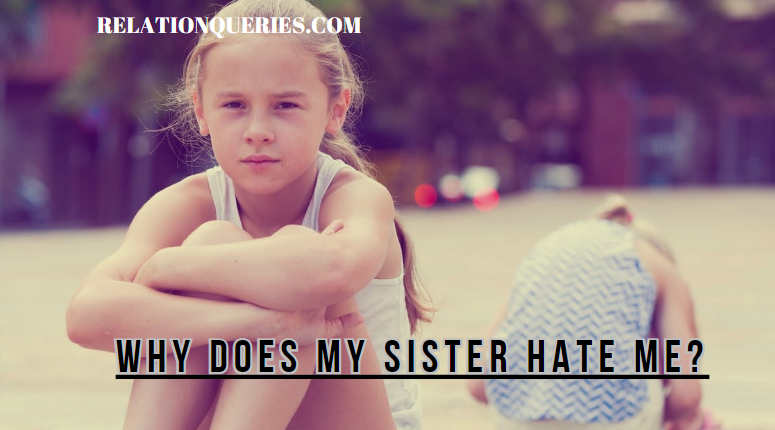
Why Does My Sister Hate Me:- Sibling relationships can be both beautiful and challenging. They are often characterized by love, support, and companionship.
However, at times, these relationships can also become strained, leading to feelings of resentment and animosity. If you find yourself wondering, “Why does my sister hate me?” you are not alone.
Many individuals experience conflicts with their siblings, and it is essential to explore the underlying reasons behind such emotions.
This article aims to delve into the complexities of sibling relationships, shed light on potential causes of animosity, and provide guidance on how to navigate these challenging situations.
9 Reasons Why Your Sister Hates You
1: Personality Differences
One significant factor that can contribute to sibling conflicts is personality differences. Siblings often possess distinct temperaments, interests, and worldviews.
These differences can lead to clashes, misunderstandings, and, in some cases, resentment.
For example, if you and your sister have contrasting personalities, it might be challenging to understand and appreciate each other’s choices and behaviors, which can create tension.
2: Sibling Rivalry
Sibling rivalry is a common phenomenon in which siblings compete for attention, resources, or parental approval. It often starts in childhood and can continue well into adulthood if unresolved.
Sibling rivalry can manifest in various ways, such as comparison, jealousy, and resentment.
If you feel that your sister hates you, it may be a result of unresolved sibling rivalry, where competition and comparison have fueled negative emotions.
3: Differences in Upbringing
Family dynamics and the environment in which siblings grow up can significantly influence their relationships.
If you and your sister were raised in a contentious or unstable household, it could have a lasting impact on your bond.
A lack of emotional support, inconsistent parenting, or favoritism can lead to feelings of resentment and bitterness.
Understanding the influence of upbringing can provide valuable insights into why your sister may harbor negative feelings toward you.
4: Communication Breakdown
Communication plays a vital role in any relationship, including sibling bonds. Miscommunication or a communication breakdown can create misunderstandings and hurt feelings.
If you and your sister struggle to express yourselves openly and honestly, it can contribute to a growing divide. Unresolved conflicts and unaddressed issues can fester, causing resentment to build over time.
5: Unresolved Past Conflicts
Unresolved conflicts from the past can create a lasting strain on sibling relationships.
Whether it is a major disagreement or a series of small misunderstandings, holding onto unresolved issues can erode trust and affection.
These conflicts can lead to built-up resentment and ultimately result in your sister harboring negative feelings toward you.
6: Comparison and Favoritism
Sibling relationships can suffer when there is a perceived or real sense of favoritism from parents or others. Constant comparison or feeling less valued than your sister can generate deep-seated resentment.
These feelings of inadequacy may cause your sister to distance herself emotionally or develop a sense of dislike towards you.
7: Life Circumstances and External Factors
Life circumstances and external factors can significantly impact sibling dynamics. Major life events, such as changes in family structure, moving away, or the introduction of new family members, can create disruptions and stress.
These changes may affect the dynamics between you and your sister, potentially leading to negative feelings.
8: Personal Issues and Projection
Sometimes, when individuals experience personal difficulties or unresolved emotional issues, they may project their frustrations onto others, including their siblings.
Your sister’s animosity towards you could stem from personal challenges unrelated to your relationship.
It is essential to consider that her negative feelings may not be solely about you but rather a reflection of her struggles.
9: Misunderstandings and Lack of Empathy
Misunderstandings and a lack of empathy can contribute to strained sibling relationships. Failure to understand each other’s perspectives, emotions, and experiences can create a sense of animosity.
Taking the time to listen actively, validate feelings, and practice empathy can help bridge the gap between you and your sister.
Related Article: Why Is My Wife Always Irritated With Me
What To Do When Your Sister Hates You
Sibling relationships can be complex and emotionally charged, with ups and downs that are a natural part of family dynamics.
However, it can be particularly challenging when you find yourself in a situation where your sister harbors strong negative feelings towards you.
Whether it’s due to past conflicts, personality differences, or other underlying issues, dealing with a sister who hates you can be distressing and emotionally draining.
In this article, we will explore strategies and advice on how to handle such a difficult situation while striving to maintain family bonds and foster personal growth.
1: Assess the situation objectively
Before taking any action, it’s crucial to step back and objectively evaluate the nature and reasons behind your sister’s animosity towards you.
Understanding the underlying causes can help you gain perspective and find potential solutions.
Reflect on past incidents, your behavior, and any significant events that may have triggered the strained relationship.
2: Communicate openly
Open and honest communication is essential when trying to mend a broken relationship with your sister.
Find an appropriate time and place to talk, ensuring both of you have the necessary emotional space to express yourselves.
Be attentive and actively listen to her concerns, acknowledging her feelings even if they are difficult to hear.
Avoid becoming defensive and instead focus on finding common ground and potential solutions.
3: Seek professional help
If the tension and animosity between you and your sister persist or escalate, seeking professional help can be beneficial.
Family therapy or counseling can provide a neutral and safe space for both of you to address your issues and work toward reconciliation.
A trained therapist can guide the conversation, facilitate understanding, and suggest practical strategies to improve the relationship.
4: Focus on personal growth
While it’s important to address the issues between you and your sister, it’s equally vital to focus on your personal growth and well-being.
Engage in activities that bring you joy and fulfillment, nurture your mental and emotional health, and surround yourself with supportive friends and family members.
By focusing on self-improvement, you can develop resilience and enhance your ability to cope with challenging situations.
5: Set healthy boundaries
Sometimes, setting boundaries might be necessary to protect your emotional well-being. This can involve limiting contact or interaction with your sister if her behavior consistently crosses the line or becomes toxic.
Communicate your boundaries assertively and respectfully, emphasizing the need for mutual respect and a healthy relationship.
Remember that setting boundaries is not about severing ties but rather about maintaining your own mental and emotional health.
6: Find common ground
Look for shared interests or activities that can help rebuild a connection with your sister. Identify common ground or hobbies that you can engage in together, fostering a sense of unity and cooperation.
These shared experiences can provide an opportunity to create positive memories and strengthen your bond.
7: Practice empathy and forgiveness
While it can be challenging, practicing empathy and forgiveness can be transformative for both parties involved.
Attempt to understand your sister’s perspective and empathize with her emotions, even if you disagree with her actions or opinions.
Similarly, examine your feelings and try to let go of resentment or anger towards her. Forgiveness doesn’t mean forgetting or condoning hurtful behavior, but rather freeing yourself from the burden of negativity.
Signs Your Sister Is Jealous Of You But Don’t Hate You
Sibling relationships are not always harmonious, and jealousy can sometimes find its way into the mix. Jealousy is a complex emotion that can arise due to various factors, including comparisons, competition, and perceived favoritism.
If you suspect that your sister may be jealous of you, it’s important to understand the signs and address the underlying issues to maintain a healthy relationship.
In this article, we will explore the common signs that indicate your sister might be feeling jealous and guide how to navigate this challenging situation.
1: Constant Comparison
One of the telltale signs of sibling jealousy is a consistent tendency to compare oneself to you. If your sister frequently compares her achievements, possessions, or appearance to yours, it may indicate underlying feelings of envy.
She might feel the need to outdo you or seek validation by being better than you in various aspects of life. This constant comparison can strain your relationship and create an unhealthy dynamic.
How to fix This
To address this issue, open communication is key. Encourage honest conversations where both of you can express your feelings without judgment.
Try to emphasize the importance of individuality and that each person’s journey is unique. Encourage your sister to focus on her strengths and accomplishments rather than constantly comparing herself to you.
2: Resentment and Criticism
Jealousy often breeds resentment and criticism. If your sister frequently makes negative comments about your choices, achievements, or lifestyle, it might be a sign of her jealousy.
She may struggle to genuinely celebrate your successes and instead find faults or downplay your accomplishments.
This behavior can stem from feelings of inadequacy or a desire to bring you down to her level.
How to Fix This
In such situations, it’s important to address the underlying emotions rather than reacting defensively. Try to have a calm and honest conversation with your sister, expressing how her criticism makes you feel.
Encourage her to share her insecurities and concerns, allowing for a deeper understanding of each other’s perspectives.
Remember that empathy and compassion are vital in overcoming jealousy and building a stronger bond.
3: Sabotaging Behavior
When jealousy intensifies, a sister may resort to sabotaging your success or happiness.
This behavior can manifest in various ways, such as spreading rumors or gossip, undermining your achievements, or even manipulating situations to make you look bad.
These actions are driven by a deep sense of envy and the desire to diminish your accomplishments or happiness.
How To Fix This
It’s essential to confront sabotaging behavior directly but with tact and grace. Avoid escalating conflicts or engaging in retaliatory actions.
Instead, calmly address the issue, expressing your concerns and emphasizing the importance of mutual support and respect. Encourage your sister to focus on her personal growth rather than resorting to destructive behavior.
If the situation persists or becomes toxic, seeking professional help, such as family therapy, can provide a safe space to address underlying issues and foster healthy communication.
4: Withholding Support
Jealousy can lead to a sister withholding support or being unsupportive of her endeavors.
Whether it’s dismissing your ideas, withholding praise, or refusing to help when you need it, this behavior can be hurtful and detrimental to your relationship.
Your sister may struggle with feelings of competitiveness or fear that supporting you might diminish her accomplishments.
How To Fix This
To navigate this challenge, it’s crucial to create an environment of open communication and understanding.
Encourage your sister to express her concerns and insecurities, and assure her that supporting each other does not mean sacrificing individual success.
Emphasize the importance of mutual support and celebrating each other’s achievements, fostering an atmosphere of collaboration rather than competition.
Conclusion (Why Does My Sister Hate Me?)
Sibling relationships can be complex, and sisterly animosity can be distressing.
However, it’s possible to improve the relationship with your sister by understanding the underlying dynamics, practicing effective communication, addressing childhood experiences, and making conscious efforts to reconcile and build stronger bonds.
Remember that resolving conflicts takes time, patience, and dedication. With perseverance and a commitment to understanding and empathy, you can work towards a healthier and more fulfilling relationship with your sister.
FAQs
A. Yes, sibling conflicts can be resolved, but it requires effort, understanding, and effective communication from both parties involved. Complete resolution may not always be possible, but significant improvements and healthier dynamics can be achieved.
A. It’s important to respect your sister’s decision if she is not ready or willing to engage in a conversation or seek reconciliation at the moment. Focus on self-growth and continue to foster a positive attitude towards the relationship. You can still work on improving yourself and your approach to the situation.
A. The timeline for rebuilding a healthy sisterly relationship varies for each individual and depends on the specific circumstances. It can take weeks, months, or even years. Patience, consistent effort, and a commitment to open communication are key.
A. Involving other family members can be helpful in certain situations, especially if they can provide neutral perspectives or mediate discussions. However, it’s important to approach this carefully and ensure everyone involved is willing to participate and contribute positively.
A. If the issues between you and your sister feel overwhelming or deeply ingrained, it may be beneficial to seek professional help. A family therapist or counselor can provide guidance, facilitate constructive conversations, and offer tools to navigate the complexities of your relationship.



